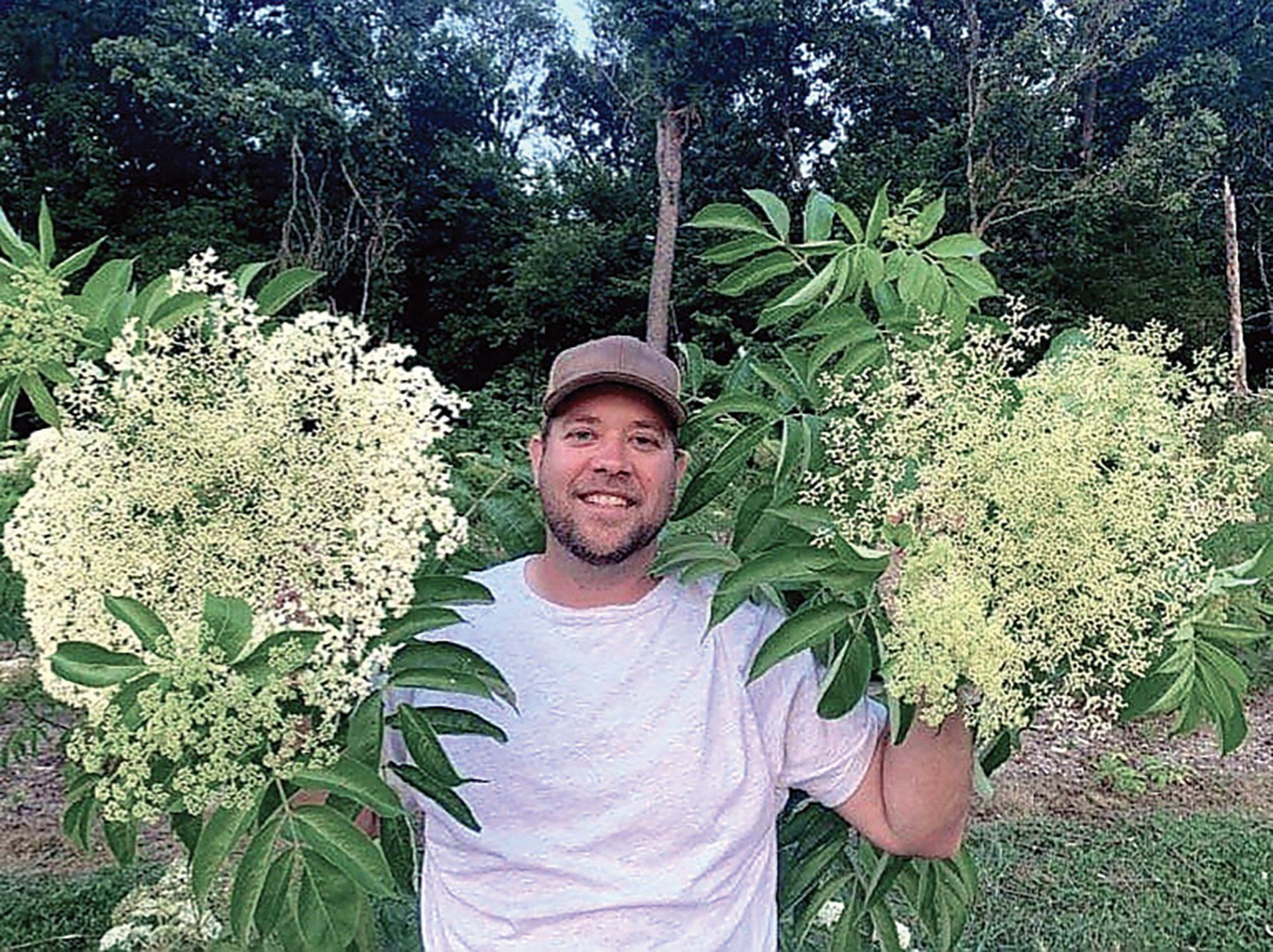Living Their Mission
Tudie's Fruities finds health and healing in traditional methods

Story by Melonie Roberts
Derek Tudor, co-owner and operator of Tudie’s Fruities in Pierce City, checks recent growth on elderberry plants that were impacted by a recent storm. After trimming the damaged branches the week prior, each plant now sprouts three or four replacement shoots from the original canes.

That’s a lot of (potential) berries. Derek Tudor, of Tudie’s Fruities, displays elderflower heads from last year’s crop. Each of the thousands of delicate blooms pictured have the potential to form a berry.
In the quiet countryside of rural Pierce City, something special is taking place.
Derek and Jennifer Tudor, owners of Tudie's Fruities Elderberry and Apiary Farms, is getting back to the basics with the traditional methods of healing used by our forefathers (and mothers) when doctors were a rare commodity and medications even more so.
“There is a lot to be said for western medicine,” Jennifer, who worked as a physical therapist for 16 years, said. “But there is also a lot of benefit from natural remedies, as well.”
As an example, Derek, Jennifer and their children, Makenna, Dreven and Millie, have all taken an elderberry immune boosting syrup daily for the past seven years.
“We started taking it when the kids were small,” Derek said. “We never get sick, catch a cold or the flu. Not even during Covid.”
Driving through Purdy one afternoon, Derek spotted a field of elderberries and that piqued his attention.
“You can produce elderberries on a small farm, and you don’t need all of the equipment that big farmers have to have,” he said. “I come from a landscaping and welding background, and we looked into the possibility of producing elderberries.”
After consulting with the University of Missouri Extension, which has completed 24 years of extensive research on the plant at College of Agriculture, Food and Natural Resources Southwest Research Center at Mount Vernon, the couple plunged in with a passion.
“Elderberries and raw honey are known for their high antioxidant properties and immune-boosting powers,” Jennifer said. “We hope to be the first U-Pick elderberry farm in Missouri.”
“Elderberries coat a person’s cells with a protective coating, making it harder for a virus to penetrate that cell wall,” Derek said. “To aid in the cross-pollination of their crop, the couple added an apiary, and those busy little bees have more than done their jobs.

Jennifer Tudor displays a head of ripened elderberries harvested from last year’s crop. Elderberry syrups may be used to treat the common cold, flu, and H1N1 or swine flu. It is also used by some HIV/AIDS patients to help boost the immune system. Elderberry can also be used to alleviate sinus pain, back and leg pain, nerve pain, and chronic fatigue syndrome. Some people use elderberry for treatment of hay fever, cancer, a laxative for constipation, to increase urine flow, and to cause sweating.
And while Missouri is famous for “growing rocks,” it is also the ideal environment for growing elderberries.
“They are very hardy,” Jennifer said. “They don’t flower until later and can handle frost or heavy rains. They are very versatile plants, and the main plant can live up to 25 years.
Derek managed to invent a “no-till” drill, making the process of planting fields much easier and quicker.
“I can plant a two-acre field in a couple of hours,” he said. “And with no-till, you aren’t out there picking up rocks for days afterward.”
The couple now has two fields in crops, and separate apiaries to aid in pollination.
“We use a compost mix of lettuce, tomato, onion, wood ash and mulch,” Derek said. “It has been tested and has been proven to be superior to other mulching products. It typically takes three years to get a crop, but our one-year plants look like three-year-old plants, and will yield $7,000 to $10,000 an acre in the second year.”
But it isn’t just the berries that are beneficial to one’s health.
While not endorsed by the Food and Drug Administration, elderflowers may be made into an extract which can be used for many medicinal purposes.
“Elderflowers and elderberries are a rich source of polyphenols and antioxidants,” Jennifer said. “They also have immune boosting vitamins and minerals and can aid in reducing inflammation. Elderberries helps to regulate the digestive system and helps to balance blood sugars. They are four times healthier than blueberries.
“When you add our farm-fresh honey, it further adds to the health benefits by relieving seasonal allergies with added immune boosting properties and powerful antioxidants,” she said. “Honey has antibacterial, antiviral, anti-fungal and anti-inflammatory properties as well. Honey is known to help heal wounds and burns and to help balance blood pressure and blood sugars. Everyone knows adding honey to tea will help soothe a sore throat and cough.”
“Honey stays good forever,” Derek said. “Archeologists unearthed a 3,000-year-old jar of honey from and Egyptian tomb and tested it. The honey was still good.”
The flowers can also be used to infuse teas (with honey!) or tossed into cake batter to impart a delicate sweet, aromatic quality. Elderflower blooms can be mixed with lemon zest and juice and sugar water for a simple cordial.
“We plan to add recipes to our website so people can sample different ways to enjoy elderberries,” Jennifer said. “There are a lot of fun and creative things to do with elderberries.”
“We are looking to establish our own immunity-boosting business,” added Derek. “Right now, science is looking into ways that elderberries impact brain science in helping decrease the risk of dementia.”
The business will feature the couple’s own immune-boosting elderberry syrup, teas, raw honey and beeswax products like lip balms, salves, body butter and candles.
“We combine the elderberry with other antioxidant sources, such as aronia berries and raw honey, along with other natural ingredients to enhance flavor and potency of our syrups,” Derek said.
And while elderberries and honey have given much to this family, they are developing ways to give back, in the form of Hives for Lives, a charitable fund where part of the proceeds from their product sales is donated to families impacted by childhood cancer.
“Hives for Lives is a separate apiary, which is placed near our second elderberry field,” said Jennifer. “We help families with bills, medical expenses, care packages, or wish list items like stuffed animals, toys, or an iPad for the children to play with during their stay at the hospital.”
Another way to support their mission is through direct support donations, where an individual or a business can donate a single medium box with frames or a complete hive set to further expand the apiary.
“We will even decorate and personalize the hive to the cause and someone’s name or work logo can be added to the hive set,” she said. “We will donate funds from those colonies annually.”
Taking a leap of faith to quit their full time jobs and dedicate their lives to better health, helping others and spending time with their children was huge, but the couple are beginning to reap the benefits from that decision.
“I didn’t want to miss out on my kids’ lives,” Derek said. “I just know I wouldn’t have a body left working 50 to 60 hours a week. We are also instilling in our children a work ethic and knowledge they won’t get anywhere else. And we are dedicated to helping others involved in the elderberry industry.”
He said while MU is leading the research in elderberry crops, approximately 25,000 acres are needed in the United States to support the industry.
“To date, there are only about 1,800 acres dedicated to the American elderberry crop,” he said. “We want to help others by mitigating the cost of getting started. We have canes ready to plant in the ground, and a wealth of information to offer those interested in helping grow the industry.

Elderflowers are more than just a lacy blossom and can be used in a number of ways. These flowers feature a number of health benefits and elderflower extract is used in medicines to treat colds, viruses and joint pain. Elderflower also adds a delightful essence when added to foods and drinks, and can be used to flavor cakes and teas.
“We are achieving our dreams by living through our own experience,” Derek Tudor said.
“After two years, we are starting to make a return on our investment. But we can’t do anything on our own. There is power in numbers.”
For more information, visit www.tudiesfruities.com or Tudie's Fruities Elderberry & Apiary Farms on Facebook or call:







